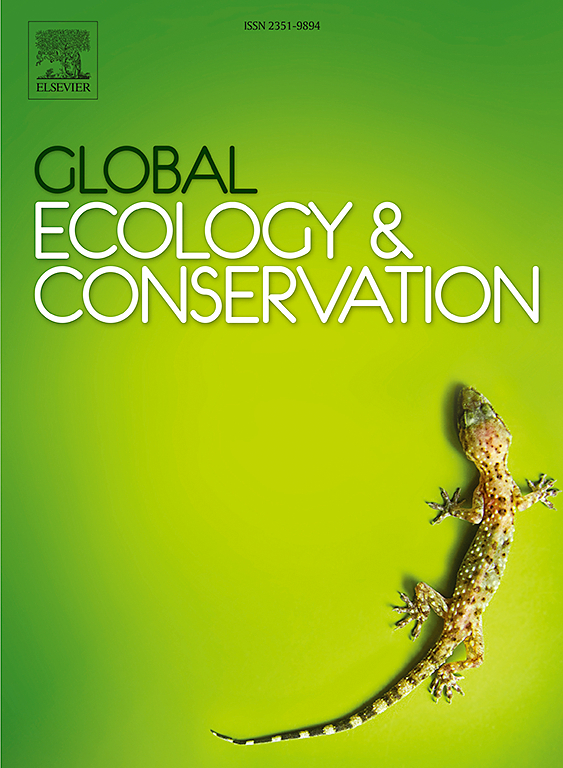疫情前后:政策转变和执法力度下中国南方非法海洋野生动物贸易的动态
IF 3.4
2区 环境科学与生态学
Q1 BIODIVERSITY CONSERVATION
引用次数: 0
摘要
本研究考察了中国南方的非法海洋野生动物贸易,重点是海龟、巨蛤和珊瑚,以评估执法挑战、市场动态和消费者行为。该报告采用多方法方法,包括对1979-2022年期间的全面政策和监管审查,以及在2019冠状病毒病大流行前后进行的市场和消费者调查。标准化培训协议用于数据收集,包括消费者问卷调查和利益相关者与各种行为者的访谈。市场调查显示,销售海洋野生动物产品的商店数量减少了17.06% %,但可供销售的商品数量增加了32.72% %,这表明贸易活动集中。消费者数据显示,大多数潜在买家年龄在23-30岁(38.93 %)和31-45岁(24.83 %),其中60% %为女性。利益相关者访谈确定了促进整个地区非法贸易的不同供应链节点。尽管在2019冠状病毒病大流行开始时进行了政策改革并加强了执法,但研究发现,由于各司法管辖区的法规不统一和执法不一致,海洋物种仍然很脆弱。卖家继续利用短期的、自上而下的执法漏洞,维持非法贸易流动,满足持续的消费者需求。调查结果强调了非法贸易网络的复原力和反应性执法战略的不足。以机构间协调和公民参与为基础的多方利益攸关方方法至关重要。如果没有持续的、社区驱动的执法机制,政策努力将仍然无效,加剧非法贸易,加速中国和更广泛的南方国家生物多样性的丧失。本文章由计算机程序翻译,如有差异,请以英文原文为准。
Before and beyond the pandemic: Dynamics of illegal marine wildlife trade in Southern China amidst policy shifts and enforcement efforts
This study examines the illegal marine wildlife trade in Southern China, focusing on sea turtles, giant clams, and corals, to assess enforcement challenges, market dynamics, and consumer behaviors. Adopting a multi-method approach, it incorporates a comprehensive policy and regulatory review spanning 1979–2022, along with market and consumer surveys conducted before and after the COVID-19 pandemic. Standardized training protocols were used for data collection, including consumer questionnaires and stakeholder interviews with a diverse range of actors. Market surveys reveal a 17.06 % decrease in the number of shops selling marine wildlife products but a 32.72 % increase in items available for sale, suggesting a concentration of trade activity. Consumer data indicate that the majority of potential buyers were aged 23–30 (38.93 %) and 31–45 (24.83 %), with 60 % identifying as female. Stakeholder interviews identify distinct supply chain nodes facilitating illegal trade across the region. Despite policy reforms and intensified enforcement at the onset of the COVID-19 pandemic, the study finds that marine species remain vulnerable due to fragmented regulations and inconsistent enforcement across jurisdictions. Sellers continue to exploit short-term, top-down enforcement gaps, maintaining illicit trade flows and meeting persistent consumer demand. The findings underscore the resilience of illegal trade networks and the inadequacy of reactive enforcement strategies. A multi-stakeholder approach—grounded in inter-agency coordination and civic engagement—is essential. Without sustained, community-driven enforcement mechanisms, policy efforts will remain ineffective, exacerbating illegal trade and accelerating biodiversity loss in China and the wider Global South.
求助全文
通过发布文献求助,成功后即可免费获取论文全文。
去求助
来源期刊

Global Ecology and Conservation
Agricultural and Biological Sciences-Ecology, Evolution, Behavior and Systematics
CiteScore
8.10
自引率
5.00%
发文量
346
审稿时长
83 days
期刊介绍:
Global Ecology and Conservation is a peer-reviewed, open-access journal covering all sub-disciplines of ecological and conservation science: from theory to practice, from molecules to ecosystems, from regional to global. The fields covered include: organismal, population, community, and ecosystem ecology; physiological, evolutionary, and behavioral ecology; and conservation science.
 求助内容:
求助内容: 应助结果提醒方式:
应助结果提醒方式:


